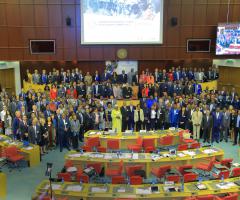The services offered by ECA to its clients can be broadly grouped within the following four knowledge-based areas:
POLICY ANALYSIS AND ADVOCACY: Policy analysis is the foundation for the policy initiatives and reforms necessary for economic and social advancement in Africa. Advocacy is closely linked to it and is focused on internal and external constituencies. In Africa, it involves the promotion of sound policies and dissemination of best practices in economic and social development. Outside Africa, it is geared towards promoting increased understanding of the complexity of the African development context. An important part of the advocacy work is fostering regional cooperation and integration by helping member States to strengthen intraregional linkages and helping to establish and strengthen subregional organizations and institutions.
CONVENING STAKEHOLDERS AND BUILDING CONSENSUS: The Commission exercises its convening power to organize major highlevel conferences and meetings, including the annual Conference of African Ministers of Finance, Planning and Economic Development, to enhance skilled human resource capacity in member States.
ENHANCING THE ROLE OF UNITED NATIONS IN AFRICA: The Commission’s regional vantage position facilitates coordination and synergies mainly among the Funds, Programmes and Specialized Agencies of the United Nations system, the African Development Forum and the Big Table, all of which support Africa’s development and are some of the most successfully employed means for dialogue, consensus building and outreach on the continent. Consensus building extends to formulation of common positions on important global issues and thus to moulding Africa’s “voice” on such issues.
TECHNICAL COOPERATION AND CAPACITY-BUILDING: Technical cooperation takes the form of on-demand regional advisory services to member States and their intergovernmental organizations, training workshops, seminars and fellowships, institution-building and field projects. Advisory services focus on clearly defined policy and technical challenges facing member States, for which the countries lack specialized expertise.







